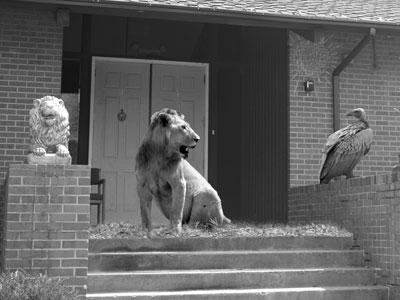Rising migration of wild African safari and jungle animals to the western United States has increasingly burdened zookeepers in America for the past ten years. “This is a real problem these days,” said zoologist Dr. Bob Faux. “Most parents see this as an opportunity to get their families a pet lion, but this has contributed to the over-domestication of lions in America.”
Enter the Colorado School of Mines. According to recent reports, the Greek establishment at Mines will be altered forever starting in the fall semester of 2013. Several Greek figureheads have confirmed that the rechristened system will consist entirely of wild animal shelters and zookeepers. Many Greek campuses around the nation have already made the transition from the ancient traditions of Greek life to the new and alternative way of animal-keeping to help the zoo relief efforts. Mines has been, as with many trends, behind the modern times on this issue. All of that will change next fall.
The adjustment to zookeeping will be a swift and rigorous process. This transition consists of three steps: renaming the Greek houses, refurbishing the structures, and training new zookeepers. Although this will require an abundance of time and resources, reports have confirmed that the new refuge system will be funded by the Fleeing Animal Keeper Establishment (FAKE) fund. Major alterations are set to be completed by the fall semester of 2013. In addition to construction, all rule changes made to the Greek system will be in effect starting next semester.
The renaming convention will keep and modify the names of the standing houses on campus. For example, it is rumored that the Sigma Alpha Epsilon house will be renamed Sigma Alpha Epsi-lion. Further allegations say the Sigma Nu house will be called the Sigma Gnus and the Sigma Kappa house will take the name the Sigma Capybaras. Despite this new naming convention, many zookeepers have assured the public that the houses will not discriminate against any animal. The houses will shelter animals of every shape and size despite their titles. Greeks from every house are preparing for the arrival of animals from lions and cheetahs to elephants and hippopotamuses.
In addition to the new names, all the houses on campus will be retrofitted to hold dozens of untamed animal refugees at any given time. Even the off-campus Sigma Gnu house is being altered to fit the needs of African animal refugees. The first adjustment consists of importing several authentic African safari and jungle plants. This is meant to make the animals feel like they are in their natural habitat. Greek officials claim that the fire-alarm sprinklers will periodically shower the animals in the tropical African forest zones. The houses will even be heated to simulate the savannah weather of southern Africa. “The main issue when building the animals’ natural habitats is trying to match the vast diversity of the African climate and geography,” Faux said. Scientists and zoologists are making every effort to ensure the animals do not feel imprisoned, but instead feel welcome in their new homes. Tall grass will make up the floor in the majority of the Sigma Capybara house, where construction has already commenced. While animals will not be permitted in the house until next semester, zookeeper training will start early this summer.
The zookeepers will accept applications in the Student Center starting May 1, 2013. Spearheading the zookeeper training effort will be Dr. Clark Kent. Kent, who studied at Nontreal University in Canada, has been nationally acclaimed for his relief effort for the African animal refugees. “I’m really looking forward to facilitating the training, and I’m glad to be able to contribute to the effort,” Kent said. The training will start late May and continue through August, when the largest migration in United States history is expected to occur. Current Greek members are filling the roles of groundskeepers for their houses. “These habitats will take a lot of maintaining, but I encourage the Greek members to apply to be zookeepers. I’ll need as many people who know the territory as possible,” Kent said. Zookeeper training is meant to be a very rigorous process. However, Kent said that the last month of training will be spent dressing the new keepers. Traditional safari guide clothes will be the new dress code for the newly instated guardians. “I still encourage them to wear loincloths to promote respect from the wild animals, but that violated tons of school rules. Tarzan has always been one of my heroes,” he said.
Many parents of current Mines students are worried about the safety of their children with wild animals on campus, but Faux put their worries to rest. “Would you rather have the animals roaming the streets or in the Greek houses with trained zookepers?” he said. Many Greek members dismiss the safety issue out of excitement for the incoming animals. Sophomore Sigma Capybara Colin Marshall shared her enthusiasm for the cause. “I’m super excited, especially for the elephants. I bet their trunks make really good night time companions,” she said. Several other Greek members have showed their support by volunteering on the Sigma Capybara construction site.
Despite the great efforts, Greek street still has a long way to go in the months ahead. The adjustment from Greek house to zoo house may seem like a big step to take place over one summer, but it is a step many Mines officials are eager to make for the sake of the wild refugees. Several Greek establishments across the nation have already made the change to help the relief efforts and now Mines can count itself one among the prestigious zookeeper campuses in America.



'Greeks go wild' has no comments
Be the first to comment this post!